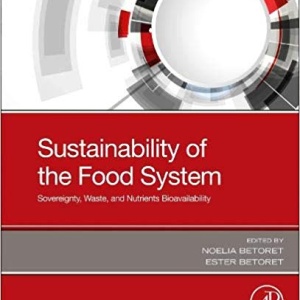
The book Sustainability of the Food System: Sovereignty, Waste, and Nutrients Bioavailability addresses food sustainability through the lens of food sovereignty, environmentally friendly food processes, and food technologies that increase the bioavailability of bioactive compounds.
Publisher’s summary
Sustainability challenges occur at all stages in the food system from production through processing, distribution, and retailing to consumption and waste disposal. Sustainability of the Food System: Sovereignty, Waste, and Nutrients Bioavailability addresses the concept of global sustainability focusing on three key areas of action within the food production system: food sovereignty, environmentally friendly food processes, and food technologies that increase the bioavailability of bioactive compounds. The book defines key concepts in the food production system and provides examples of specific and tailored actions that contribute to global sustainability.
Sustainability of the Food System: Sovereignty, Waste, and Nutrients Bioavailability will serve as a welcomed resource for food scientists and technologists, agriculturists, agronomic engineers, food engineers, environmental technologists, nutritionists, and post-graduate students studying bioresource technology and sustainability.
Reference
Betoret, N. and Betoret, E. (eds.) (2020). Sustainability of the Food System: Sovereignty, Waste, and Nutrients Bioavailability, 1st Edition. Elsevier Academic Press, Cambridge.
Read more here. See also the Foodsource building block What is food loss and food waste?












Post a new comment »